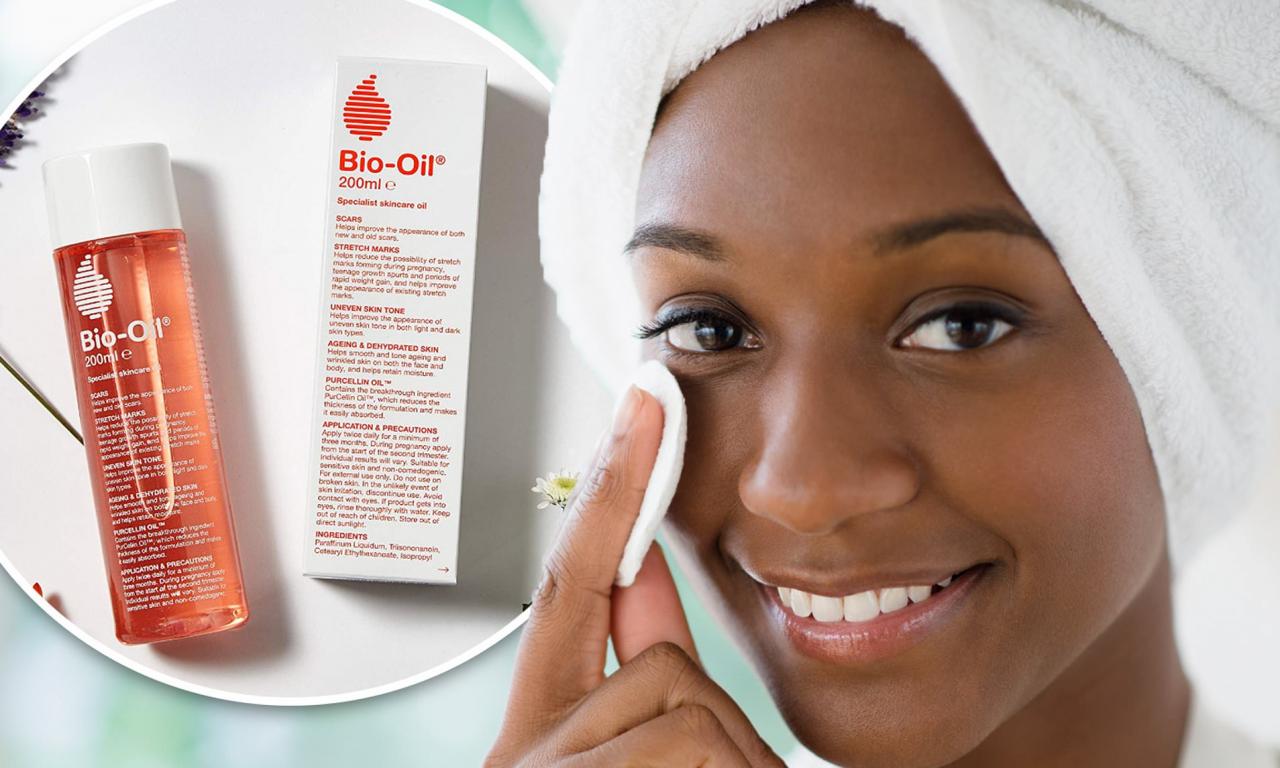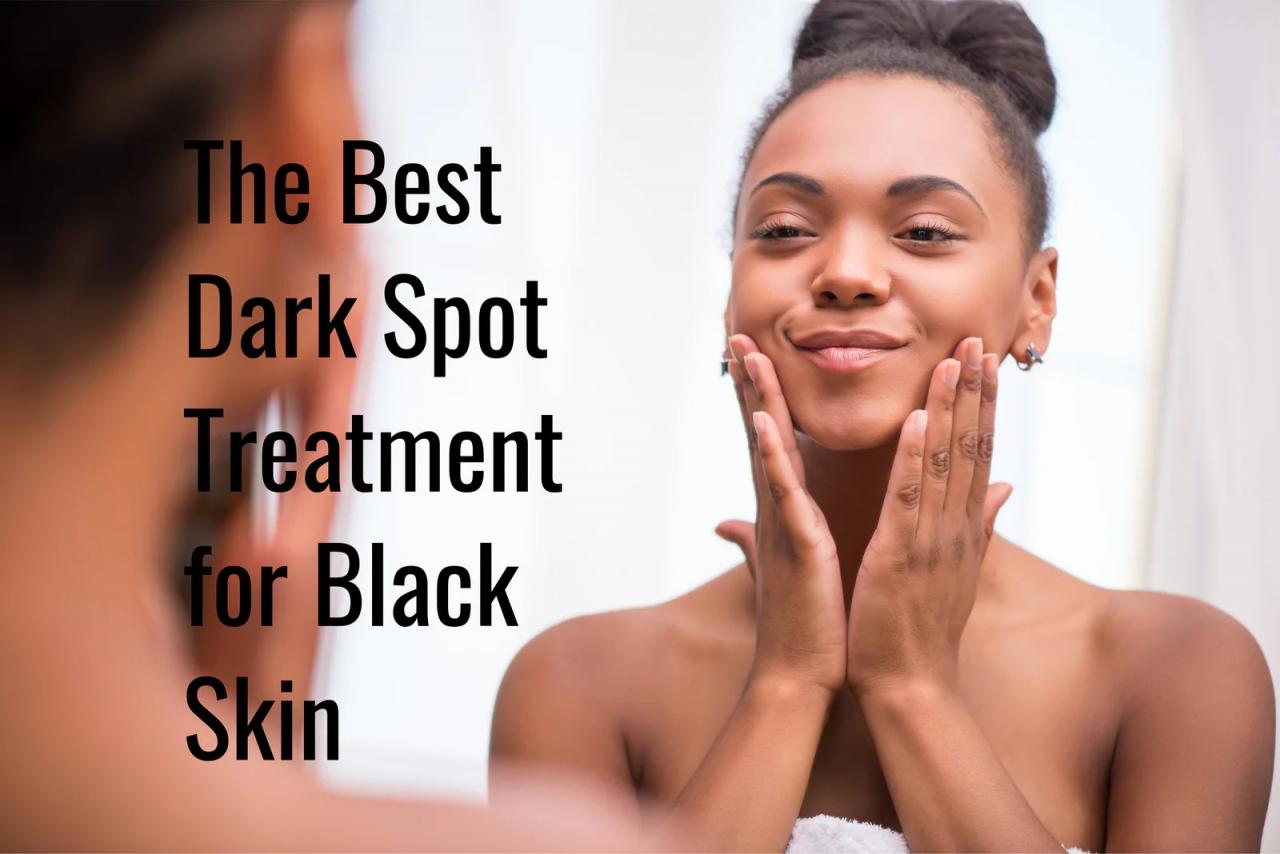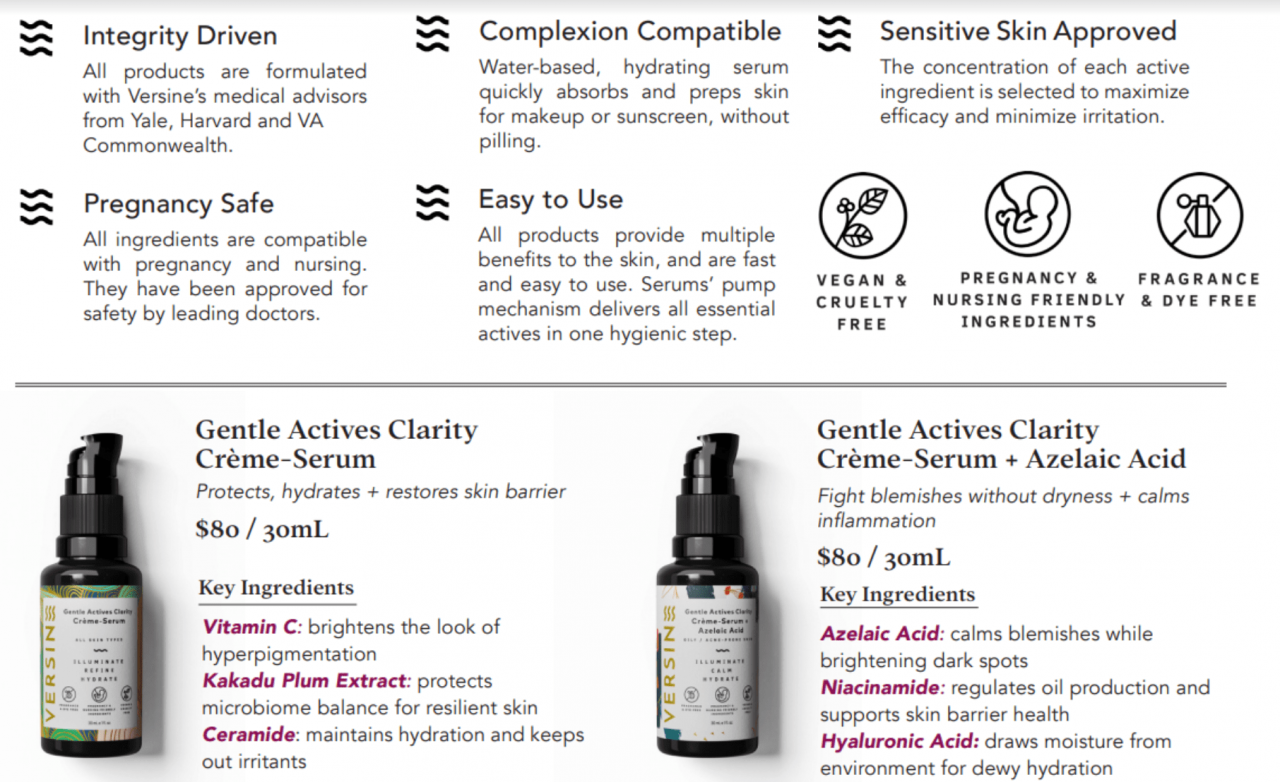As skincare for dark spots takes center stage, this opening passage beckons readers into a world crafted with good knowledge, ensuring a reading experience that is both absorbing and distinctly original. With a focus on providing clear and concise information, this comprehensive guide delves into the realm of dark spots, empowering readers with the knowledge and tools to achieve a brighter, more even complexion.
From understanding the different types of dark spots and their causes to exploring effective ingredients and skincare routines, this guide serves as a valuable resource for anyone seeking to address this common skin concern. By combining scientific insights with practical advice, this guide empowers readers to make informed decisions about their skincare regimen and achieve their desired results.
Types of Dark Spots
Dark spots are common skin concerns that can affect people of all skin types. They appear as areas of skin that are darker than the surrounding skin and can range in size and shape.
There are several different types of dark spots, each with its own unique causes and risk factors.
Hyperpigmentation
Hyperpigmentation is a condition in which the skin produces too much melanin, the pigment that gives skin its color. This can lead to the formation of dark spots, which can be flat or raised.
To achieve a radiant complexion, it’s crucial to invest in a prequel skincare regimen that caters to your specific skin concerns. Incorporate a tailored rutina de skincare that addresses your skin’s needs, such as hydration, anti-aging, or blemish control. For a revitalizing boost, try the sonäge skincare saffron energizing vitamin mask . Its potent blend of saffron and vitamins revitalizes dull skin, leaving it refreshed and glowing.
Alternatively, for a transformative skincare experience, explore the drunk elephant skincare routine , renowned for its clean and effective formulations.
Hyperpigmentation can be caused by a variety of factors, including sun exposure, hormonal changes, and certain medical conditions.
Melasma
Melasma is a type of hyperpigmentation that is caused by sun exposure and hormonal changes. It is most common in women who are pregnant or taking birth control pills.
Melasma typically appears as dark, blotchy patches on the face, although it can also occur on other areas of the body that are exposed to the sun.
Post-inflammatory Hyperpigmentation
Post-inflammatory hyperpigmentation (PIH) is a type of dark spot that develops after an injury or inflammation to the skin.
PIH is caused by the overproduction of melanin in the skin as it heals. This can lead to the formation of dark spots that can be flat or raised.
PIH can be caused by a variety of factors, including acne, eczema, and psoriasis.
Ingredients for Dark Spot Reduction

Skincare products for reducing dark spots often contain a combination of active ingredients that work together to lighten and fade the appearance of these discolorations. These ingredients can be broadly categorized into two main types: tyrosinase inhibitors and exfoliants.
Tyrosinase Inhibitors
Tyrosinase inhibitors are ingredients that work by blocking the action of tyrosinase, an enzyme involved in the production of melanin, the pigment that gives skin its color. By inhibiting tyrosinase, these ingredients can reduce the production of melanin and lighten dark spots.
Maintaining a healthy and radiant complexion requires a consistent rutina de skincare . While traditional skincare focuses on treating existing issues, prequel skincare takes a proactive approach by preventing future damage. By incorporating products like sonäge skincare saffron energizing vitamin mask into your regimen, you can nourish your skin from the inside out.
If you’re looking for a comprehensive and effective skincare routine, consider exploring the renowned drunk elephant skincare routine for a truly transformative experience.
- Hydroquinone: A potent tyrosinase inhibitor that is commonly used in over-the-counter skincare products. It is effective in reducing dark spots, but can cause skin irritation and ochronosis, a bluish-black discoloration of the skin, in some individuals.
- Kojic acid: A natural tyrosinase inhibitor derived from mushrooms. It is less irritating than hydroquinone and can be used in skincare products for sensitive skin.
- Arbutin: A natural tyrosinase inhibitor derived from the leaves of the bearberry plant. It is a milder alternative to hydroquinone and is suitable for all skin types.
- Vitamin C (ascorbic acid): A powerful antioxidant that also inhibits tyrosinase. It can help to lighten dark spots and brighten the overall complexion.
- Niacinamide (vitamin B3): A water-soluble vitamin that inhibits tyrosinase and has anti-inflammatory properties. It can help to reduce the appearance of dark spots and improve skin tone.
Exfoliants
Exfoliants are ingredients that help to remove dead skin cells from the surface of the skin. This can help to lighten dark spots by removing the layers of skin that contain excess melanin. Exfoliants can be physical or chemical:
- Physical exfoliants: These are typically scrubs that contain abrasive particles, such as sugar, salt, or ground nutshells. They physically remove dead skin cells from the surface of the skin.
- Chemical exfoliants: These are typically acids, such as glycolic acid, lactic acid, or salicylic acid. They work by dissolving the bonds that hold dead skin cells together, allowing them to be easily removed.
It is important to note that exfoliants can be harsh on the skin, so it is important to use them gently and avoid over-exfoliating.
Skincare Routine for Dark Spots
To effectively reduce the appearance of dark spots, consistency and patience are crucial. Follow this comprehensive skincare routine specifically tailored for dark spot reduction:
Cleansing
Begin with a gentle cleanser to remove dirt, oil, and impurities without stripping the skin of its natural moisture. Choose a cleanser that is formulated for your skin type and concerns, such as one with brightening or exfoliating properties.
Exfoliation
Exfoliate regularly, 1-2 times per week, to remove dead skin cells and promote cell turnover. This helps lighten dark spots and improve the absorption of other skincare products. Opt for a gentle exfoliator with fine, rounded particles to avoid irritation.
Serum Application
Apply a serum specifically formulated to target dark spots. Look for serums containing ingredients like vitamin C, niacinamide, or alpha-arbutin, which have been shown to inhibit melanin production and brighten the skin.
Sun Protection, Skincare for dark spots
Sun protection is essential for preventing further darkening of dark spots. Apply a broad-spectrum sunscreen with an SPF of 30 or higher every morning, even on cloudy days. Reapply throughout the day as needed, especially after sweating or swimming.
Home Remedies for Dark Spots: Skincare For Dark Spots
Home remedies can be an effective and affordable way to reduce dark spots. They are made with natural ingredients that are gentle on the skin and can help to lighten dark spots over time. However, it is important to note that home remedies are not a quick fix and may take several weeks or months to show results.
Some of the most effective home remedies for dark spots include:
Lemon Juice
- Lemon juice is a natural bleaching agent that can help to lighten dark spots.
- To use lemon juice as a home remedy for dark spots, simply apply fresh lemon juice to the affected area and leave it on for 10-15 minutes.
- Rinse the area with cool water and pat dry.
- Repeat this process once or twice a day until the dark spot has faded.
Turmeric
- Turmeric is a spice that has anti-inflammatory and antioxidant properties.
- These properties can help to reduce the appearance of dark spots.
- To use turmeric as a home remedy for dark spots, mix 1 teaspoon of turmeric powder with 1 tablespoon of water to form a paste.
- Apply the paste to the affected area and leave it on for 15-20 minutes.
- Rinse the area with cool water and pat dry.
- Repeat this process once or twice a day until the dark spot has faded.
Aloe Vera
- Aloe vera is a plant that has soothing and anti-inflammatory properties.
- These properties can help to reduce the appearance of dark spots.
- To use aloe vera as a home remedy for dark spots, apply fresh aloe vera gel to the affected area and leave it on for 15-20 minutes.
- Rinse the area with cool water and pat dry.
- Repeat this process once or twice a day until the dark spot has faded.
Prevention and Management
Proactive measures can help prevent the formation of dark spots and minimize their appearance over time.
Lifestyle Factors
Certain lifestyle factors can contribute to the development of dark spots:
- Sun exposure:UV rays stimulate melanin production, which can lead to hyperpigmentation.
- Hormonal imbalances:Pregnancy, menopause, and thyroid issues can affect melanin production.
- Inflammation:Acne, eczema, and other inflammatory skin conditions can cause post-inflammatory hyperpigmentation.
- Harsh chemicals:Some skincare products and bleaching agents can irritate the skin, leading to dark spots.
Prevention and Management Tips
To prevent and manage dark spots, consider the following tips:
- Sun protection:Use sunscreen with an SPF of 30 or higher daily, even on cloudy days.
- Avoid harsh chemicals:Choose skincare products that are gentle and non-irritating.
- Treat underlying conditions:Address hormonal imbalances or skin conditions that may contribute to dark spots.
- Seek professional advice:If home remedies are ineffective, consult a dermatologist for personalized treatment options.
Closing Summary

In conclusion, skincare for dark spots is a multifaceted endeavor that requires a holistic approach. By understanding the underlying causes, incorporating effective ingredients into your routine, and adopting a consistent skincare regimen, you can effectively reduce the appearance of dark spots and achieve a brighter, more radiant complexion.
Remember, patience and consistency are key, and with the right approach, you can achieve your skincare goals and embrace a more confident and radiant you.
Query Resolution
What are the different types of dark spots?
Dark spots can be classified into several types, including hyperpigmentation, melasma, and post-inflammatory hyperpigmentation. Hyperpigmentation occurs when the skin produces excess melanin, resulting in darkened areas. Melasma is a common type of hyperpigmentation that often appears on the face, particularly in women.
Post-inflammatory hyperpigmentation develops after skin inflammation or injury, leaving behind darkened patches.
What are the best ingredients for reducing dark spots?
Effective ingredients for reducing dark spots include hydroquinone, kojic acid, niacinamide, vitamin C, and retinoids. Hydroquinone is a powerful lightening agent that inhibits melanin production. Kojic acid is a natural skin brightener that helps fade dark spots. Niacinamide, also known as vitamin B3, reduces inflammation and improves skin tone.
Vitamin C is an antioxidant that protects the skin from free radical damage and promotes collagen production. Retinoids, derived from vitamin A, help increase cell turnover and reduce hyperpigmentation.
What is a good skincare routine for dark spots?
A skincare routine for dark spots should include cleansing, exfoliation, serum application, and sun protection. Start by cleansing your skin twice a day with a gentle cleanser. Exfoliate your skin 1-2 times per week to remove dead skin cells and promote product absorption.
Apply a serum containing brightening ingredients like hydroquinone or vitamin C to target dark spots. Finally, protect your skin from the sun by applying a broad-spectrum sunscreen with an SPF of 30 or higher every day.
Are there any effective home remedies for dark spots?
Some effective home remedies for dark spots include using lemon juice, turmeric, and aloe vera. Lemon juice contains citric acid, a natural bleaching agent that can help lighten dark spots. Turmeric has anti-inflammatory and antioxidant properties that can help reduce hyperpigmentation.
Aloe vera is a soothing and moisturizing agent that can help calm the skin and reduce inflammation.
How can I prevent dark spots from forming?
To prevent dark spots from forming, protect your skin from the sun by wearing sunscreen, avoiding harsh chemicals, and seeking shade during peak sun hours. Additionally, avoid picking or scratching at your skin, as this can lead to post-inflammatory hyperpigmentation.
If you have a history of dark spots, consider using products that contain ingredients like niacinamide or vitamin C, which can help prevent hyperpigmentation.





Leave a Reply